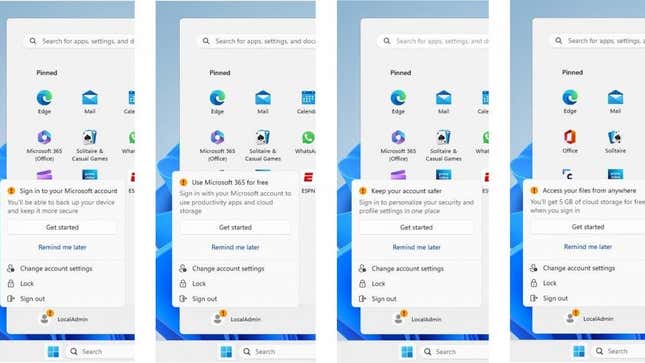
Microsoft’s Windows 11 Start Menu is becoming more and more like a dancing inflatable tube man gesticulating wildly outside a used car lot. The last Windows 11 update added advertisements for Microsoft’s OneDrive cloud backups for some users when they click on the little Windows icon on the desktop. Now the Redmond, Washington company wants to bombard you with more ads for its other “free” services every time you go to sign out.
The company shared details about its Windows 11 Insider preview build 23435 Friday. This beta build, which is just going out to Insider users for now, includes a new “Gallery” mode for File Explorer, which should make it easier to browse photos. But more importantly, the company shared details on its controversial in-OS advertising scheme that it’s now dubbed “badging.” These not-ads appear for local user accounts as small messages hovering right above the sign out button when clicking on the Start menu.
The company claims that this will help users recognize the “benefits” of signing up for a Microsoft account, OneDrive, Microsoft’s Office replacement (365), and other security services. It’s unclear based on the messages if the 365 ad will navigate to the company’s 1-month free trial, but one of the ads does mention the initial, bare 5GB of cloud storage offered for free on OneDrive when signing up. The previous version of the OneDrive ad shown by Microsoft last month came with alarming “Back up your files” text, while the new version reads simply “Access your files from everywhere.”
For comparison, Google Drive gives users 15GB of storage for free, though that total is shared among Gmail and Google Photos. Microsoft offers users an additional 15GB of email storage not connected to OneDrive.
These ads “highlight the benefits of signing in with a Microsoft account,” according to the company, and are targeted primarily at local account users. Microsoft tried to downplay the badging rollout by reminding users it’s taking feedback for these ads. The company has been trying out various advertising schemes in its start menu since late last year, and the user response online has been mostly negative.
Of course, there’s going to be a fair bit of negativity bias for any change like this. Users can currently disable these ads by navigating through Windows settings, but if these ads go live, most regular users won’t have the wherewithal to disable them. Microsoft has not made the option to disable the ads clear in any of its messaging so far.
It’s a bold move, considering how Microsoft itself as well as its biggest competitors are wrangling regulation and lawsuits over allegations of anticompetitive practices. Apple and Amazon in particular have come under fire for pushing their own products in their App Store and online marketplace, respectively.
It doesn’t take much to imagine all the other ways the tech giant could nudge regular users into buying into its services, whether through File Explorer or perhaps even the boot screen... oh wait, it’s already tried that before.